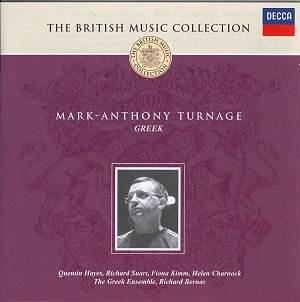Mark-Anthony Turnage’s Greek (to a libretto
by Steven Berkoff using his own story ‘Oedipus-in-the-east-end’) won
two awards and a standing ovation at its premiere in Munich in 1988.
It was recorded for the enterprising Argo label and appeared in 1994
with a warning on the front ‘This opera contains bad language"
and so it does, quite a good deal of it too. Now however in this newly
packaged product there is no warning and it comes in a plain purple
wrapper soberly marked ‘The British Music Collection’ with a little
picture of Turnage on the front, and now under the ‘safe’ umbrella of
the ever solid Decca company. So it seems that the opera has slipped
surreptitiously into the ‘classic category’ without anyone noticing.
Now retailing at about £10 the presentation is shorn of its rehearsal
photographs, the text is fully given, but rather more microscopically,
and the booklet notes now lack a synopsis.
Even so, we should be proud that this extraordinary
work is available again. I write this having recently had a surfeit
of Turnage over a weekend devoted to his music culminating, as far as
Radio 3 was concerned, in a live performance of this opera. Time has
mellowed the stage performance I feel, so the roughness of the original
is more keenly felt on this recording, which, like all great performances,
takes risks. There is a shocking freshness about it, which still registers
as female voices stridently chime out four letter words.
Yet, for me some problems have not gone away and I
will share them. To my ears the libretto’s cockney has become something
of a problem. It’s partly that twisted vowels and glottal stops don’t
sit comfortably on classically trained voices. The cast do wonders,
but can’t avoid reverting to Home Counties whenever an awkward note
needs to be genuinely sung. It’s also hard to know how the singers who
have been trying very hard at their ‘gor-blimeys’ and their ‘’ere we
goes’ should enunciate Berkoff’s perplexing side-lurches, such as "confess
my dear, the quandary that doth crease your brow" and the like.
At the start even, Eddie/Oedipus tells us that he was "spawned
in a Tuffnell Park that’s no more than a stone’s throw from the Angel,
a monkey’s fart from Tottenham or a bolt of phlegm from Stamford Hill.
It’s cesspit, right …" Sorry to be a pedant but, and I acknowledge
that my London geography is possibly a little more hazy these days,
these places are quite some way apart. Thatcher’s Britain forms the
backdrop to the opera’s plot, but its depiction is weakened by these
not quite accurately observed moments. Also Theban plagues, which run
through the events, seem oddly out of place with shouting policemen
and football hooligans.
The skewed focus does not diminish the directness and
ingenuity of Turnage’s idiom, which for all its echoes of Weill and
rock, its obvious roots in Stravinsky, centres on moody, often beautiful
lyricism as in the love aria of Act 2. Another influence, particularly
in the harp and percussion sounds, is surely Britten, more particularly
the Britten of the Church Parables. The opera’s sonorities are
precise and memorable. It has, in the crucial scenes, a gravity that
can rise to eloquence, even nobility.
The performances can hardly be bettered but the place
of this opera in the repertoire will depend on whether it is possible
for audiences to reconcile the cockney with the sophisticated, the working
class background with the intellectualism. The recording incidentally
pitches the opera at you hot and strong.
Gary Higginson
see also review
by Tony Haywood
